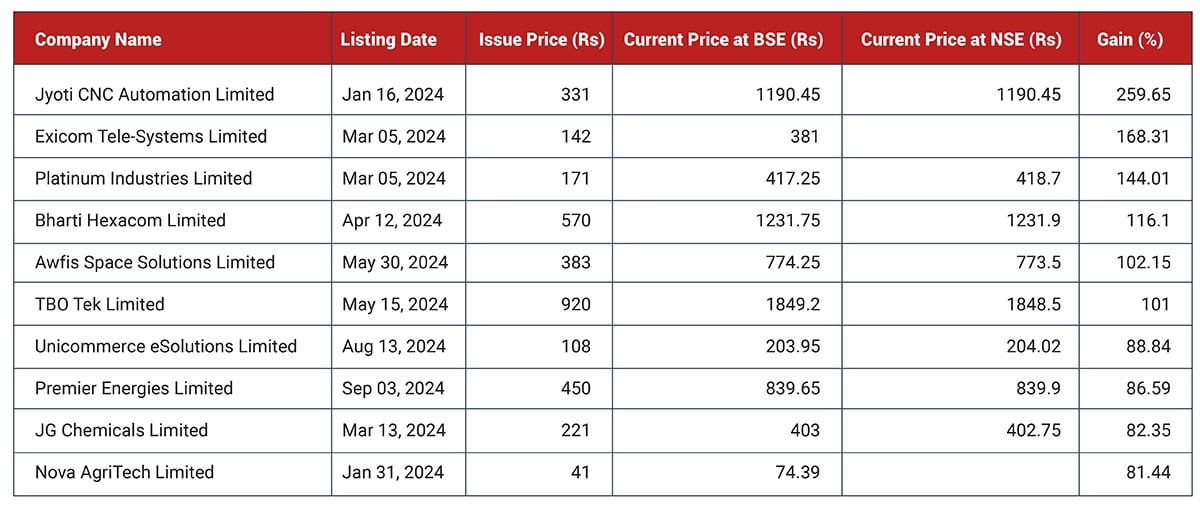IPO Listing Process in India: 8 Key Steps and Best Practices

IPO Listing Process in India: 8 Key Steps and Best Practices
IPO listing in India: Know all about key benefits, eligibility, regulatory requirements, right advisors, and company valuation
- Last Updated
With a transparent IPO listing process, favorable regulations, and high retail participation, the Indian IPO market is at a golden age. In 2023 we had 57 successful IPOs on the mainboard that raised INR 49,437 crores, and by Q2 of 2024, we already have 51 successful IPOs on the mainboard that collectively raised INR 53,622 crores!
Here are the top 10 IPO performances in 2024 that have benefited from India’s ongoing bull market giving at least 80% listing profits to investors:

While the global economy has narrowly avoided recession, the Indian economy has thrived with oversubscribed IPOs and Nifty touching all-time highs crossing 26,200 points. It has successfully navigated the ongoing Russia-Ukraine War and rising Middle East tensions indicating its high resilience. If you are a business across small, medium, or enterprise segments looking to raise capital to scale — there is no better time than today. In this blog, we have detailed the complete IPO listing process in India.
What is an IPO?
Companies opt for the Initial Public Offering (IPO) listing process to offer their shares to the public in the primary market for the first time, transitioning to a publicly traded entity. In India, the stocks are listed at the National Stock Exchange (NSE) or the Bombay Stock Exchange (BSE) for the mainboard and the BSE SME exchange or NSE Emerge if you opt for SME listing. Your company’s IPO can either issue fresh securities, sell its existing securities, or use a combination of both.
How long does it take to complete the IPO listing process?
The ideal timeframe for the SME IPO listing process in India is 6–8 months, while the mainboard IPO listing process is 10–12 months.
5 Key Benefits of IPO Listing in India
IPOs often mark as a key step in a business’ growth story, with the following benefits:
- Raise capital: Access to significant funds for expansion and development
- Exit for existing shareholders: Provides liquidity for early investors and founders
- Currency for Acquisition: Publicly traded shares can be used as a medium for acquisitions
- Improved corporate governance: Adherence to regulatory standards enhances accountability.
- Credibility and brand visibility: Being listed on stock exchanges boosts a company’s profile and trustworthiness.
Is your business market ready for an IPO? — use this assessment checklist to find out
Before you invest in preparing for the IPO listing process in India at BSE or NSE, learn how to predict IPO performance by assessing your business’s current reality versus market expectations:
1. Company’s financial performance
- Does your company have a vision and a clear growth plan ready?
- Can you meet the accounting standards required by the market regulators?
- Do you have clean historical data available about your business?
- If your 3-year CAGR > 15%?
- Is your debt-to-equity ratio below 3:1?
2. Gauge the market’s appetite
- Are current market conditions favorable for an IPO?
- Is there sufficient investor demand for the company’s industry and the products or services?
3. Ensure shareholder alignment
- Are existing shareholders aligned on the decision to go public and are in it for the long term?
- Has your company considered the implications of increased transparency and disclosure requirements?
- Are there any potential conflicts or disagreements among shareholders?
4. Ensure corporate governance
- Can the management team effectively communicate the company’s story to potential investors?
- Does your company have a strong system of internal controls and risk management?
- Are there independent directors on the board who can provide oversight and guidance?
- Are your IT systems equipped to meet the post-IPO demands of a public company?
5. Consider the investment required after the IPO listing process
- Has your company considered the resources and talent required to operate as a public company?
Step 1: How to prepare for IPO?
Based on your answers from the IPO–readiness checklist, you must close the gap between the market expectations and your company’s current business status. Hence following the IPO listing process is not a one-off event, it has the potential to completely transform your business.
Choose the exchange to get listed
First, choose which exchange your company plans to get listed at. For example, are you eligible for a mainboard listing, or is the SME exchange more suitable?
Your IPO listing process will depend on compliance and procedures followed by the exchange and its governing bodies. This is an important decision as your company may have to overhaul its internal structure and resources to meet its requirements. This guide focuses on the Indian markets with NSE or BSE as the exchange of choice and best practices by the InCorp Advisory team.
Select the right IPO advisors
Pre-IPO listing process is a critical stage that can significantly help you save resources and time. Hence, it is advisable to opt for a professional IPO advisory firm that has:
- Experience: Look for advisors with a strong track record in IPOs.
- Expertise: Ensure they know the specific industry.
- Network: A well-connected advisor can facilitate investor relations.
- Alignment: Understands and can work as per your company’s culture.
At InCorp Advisory, we help you navigate this pre-IPO listing process complexity across exchange selection, IPO marketing, and management.
Write your ‘IPO story’
To achieve excellent valuations, you must align your past business achievements and current trajectory to paint the picture of the company’s future growth potential. For example, the Indian startup Zomato was listed in 2021, and today, as of September 2024, it commands a stock price of INR 280 with a market capitalization of INR 2.16 trillion. Here’s how it started as a startup to a listed company:
Timeline of Zomato’s Journey
 Image: Tracxn
Image: Tracxn
To achieve this, Zomato crafted the story of how they went from a restaurant listing app to building an infrastructure for a complete food business — from picking ingredients for restaurants to delivery. Post-listing, they continued with their growth story that highlighted entering allied industries like grocery delivery and events. Similarly, your company needs to craft its core vision, mission, and business story highlighting key achievements and value propositions. Explore using a business plan to streamline your strategy so that it would make investors bet on your company.
Step 2: Complete regulatory requirements for IPO listing
Here, your IPO advisory team will help you determine if your company is eligible for IPO based on regulatory requirements set by the Securities Exchange Board of India (SEBI) and the exchanges (BSE or NSE).
Who is eligible for the IPO listing process?
Learn more about the eligibility criteria set by SEBI Regulations 2018 for the IPO listing process or contact the InCorp Advisory team. For example, according to SEBI’s regulations, if the company, its promoters, or selling stakeholders are debarred from accessing the capital market, then the entity will not be eligible for the IPO listing process.
Step 3: Perform due diligence
Your IPO advisory partner, along with the Merchant Bankers and Legal Advisors, will help you perform complete due diligence across your financials, legal structure, commercial business model, and IPO story to get ready for SEBI’s approval for the IPO listing process.
Financial due diligence
Involves reviewing the company’s balance sheets, income statements, tax returns, and cash flow statements for the past three to five years. IPO advisory services also assess the effectiveness of internal controls over financial reporting.
Legal due diligence
Involves reviewing the company’s articles of incorporation, bylaws, and shareholder agreements. It will also identify any pending or threatened litigation against the company or other potential risks that may get your IPO application rejected by SEBI.
Commercial due diligence
Involves evaluating the company’s business model, market positioning, competitive landscape, technology infrastructure, and how the funds raised will be used to achieve projected growth.
Step 4: Determine the company valuation
It involves blending various valuation methods like DCF analysis, comparable company analysis, and precedent transactions analysis to get a comprehensive view of the company’s valuation. One can opt to assign relative weight to each method depending on factors such as:
- Company’s development stage
- Availability of comparable companies and transactions
- Reliability of the company’s financial projections
The valuation is also influenced by market conditions and investor sentiment, which can change rapidly in the period leading up to the IPO.
Step 5: How to structure and price the IPO
After understanding the business valuation, the IPO advisors will calculate the fair issue price and allotment size. This requires careful consideration of various factors to balance the interests of the company, its investors, and market conditions
How is the listing price calculated in an IPO?
There are two primary IPO pricing structures to consider for your IPO listing process:
- Fixed Price Issue: Company sets a specific IPO price for its shares. If the IPO price is fair, it offers transparency to investors; if it is too high, it may deter them, and if it is too low, the company might not raise enough capital.
- Book-building issue: Company sets an IPO price range and investors bid within that range. The final price is determined by market demand observed during the bidding process.
By step 5, you have enough documents and research completed to start the registration and IPO listing process with SEBI and exchanges like NSE or BSE.
Step 6: How to file with SEBI and Stock Exchanges
For registering with SEBI and NSE or BSE for the IPO listing process, you must first prepare the Red Herring Prospectus (RHP) document.
How to draft the Red Herring Prospectus (RHP) document?
To draft the Red Herring Prospectus (RHP), start with preparing the Draft Red Herring Prospectus (DRHP), which details the company’s products, operations, financials, and growth plans, but excludes IPO specifics like offer price or number of shares. The DRHP is circulated for feedback and submitted to SEBI for review to ensure regulatory and investor protection compliance.
After SEBI’s approval, the company updates the document to include the issue size and share price range, forming the RHP. SEBI’s final approval allows the RHP to be published, providing investors with essential information to make informed decisions during the IPO offer period.
How to register for the IPO listing process at NSE?
Submit the final RHP and make an application for admission — you can download the required forms available on the NSE IPO website, which includes the submission link.
How to register for the IPO listing process at BSE?
Explore the IPO listing process by BSE and contact them to understand the registration and document submission steps.
Step 7: How to market the IPO via roadshows?
Your company has to market the IPO story and make it resonate with potential investors to generate interest. The management team and their IPO advisory conduct IPO presentations and investor meetings at key cities to provide IPO information and address investor concerns.
Step 8: Navigating the IPO allotment process
After the IPO listing process and subscription, the company and its IPO advisor begin the fair allotment process among retail, HNI, and institutional investors.
What is IPO bidding?
Investors submit their bids during the IPO listing process’s subscription period. They specify the number of lots they wish to purchase and the bid price.
How are IPOs allotted?
If the IPO is undersubscribed, all applicants receive the number of lots they applied for. If it is oversubscribed usually, the registrar conducts a lottery to allocate share lots. Shares will be credited to the demat accounts of successful bidders, while the blocked funds of unsuccessful bidders will be released.
Why Choose InCorp Advisory?
The IPO listing process is complex and requires the concerted efforts of several stakeholders. At InCorp, we have an expert team of consultants who have years of expertise in helping companies list their securities on the stock exchange. To learn about our services, you can reach out to us at (+91) 77380 66622 or email us at info@incorpadvisory.in.
Authored by:
InCorp Global
Frequently Asked Questions
For the NSE and BSE IPO listing process on the mainboard, the paid-up capital should be at least 10 crores.
Retail investors can invest up to 2 lakhs while non-institutional investors (like high net worth individuals (HNIs), companies, trusts, etc.) can invest a minimum of 2 lakhs.
Application Supported by Blocked Amount (ASBA) by SEBI allows temporary blocking of the IPO money in the bank account till the applicant gets allotted shares. If they do not get any allotment, the money is unblocked.
A company can open its IPO for a subscription for a minimum of 3 days and a maximum of 10 days. While BSE and NSE stock exchanges accept IPO applications between 10 AM and 5 PM (except on holidays).
IPO listing process costs involve underwriting, accounting, printing, marketing, and legal fees — all of which incrementally increase post-IPO. While SEBI, NSE, and BSE exchanges also have their initial and annual IPO listing process fees — contact the InCorp Advisory team to learn more.
Share
Share







































































